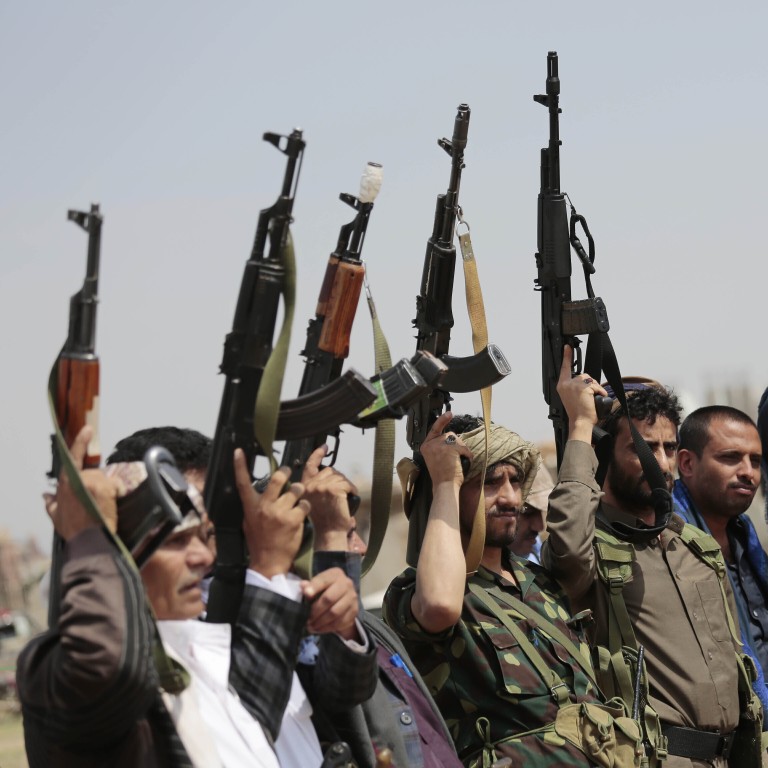
Saudi Arabia offers ceasefire to Yemen’s Houthi rebels
- The move by Saudi Arabia comes after the rebels stepped up a campaign of drone and missile attacks targeting the kingdom’s oil sites
- Riyadh made two concessions to the Houthis in the plan, while not offering everything the rebels previously wanted
Saudi Arabia has waged a war that saw it internationally criticised for air strikes killing civilians and embargoes exacerbating hunger in a nation on the brink of famine.
Saudi Arabia thwarts Houthi missile attack on capital Riyadh: military
“We announce an initiative to end the crisis and reach a comprehensive political solution, which includes a comprehensive ceasefire under the supervision of the United Nations,” Saudi Foreign Minister Prince Faisal bin Farhan told journalists in a televised news conference in Riyadh.
“It is up to the Houthis now,” he said. “The Houthis must decide whether to put their interests first or Iran’s interests first.”
A senior Houthi official, who spoke on condition of anonymity under regulations, said the rebels had been aware of the proposal and in direct communication with the Saudis, as well as Omani interlocutors. However, he said the Saudis needed to do more to see a ceasefire implemented.
Saudi Arabia said the plan would be presented both to the Houthis and Yemen’s internationally recognised government later Monday. Both would need to accept the plan in order for it to move forward, with any timeline likely to be set by UN Special Envoy to Yemen Martin Griffiths.
Saudi Arabia has had direct contact with the Houthis before Monday’s announcement, as well as through intermediaries like the UN, the US and the sultanate of Oman.
Saudi Arabia made two concessions to the Houthis in the plan, while not offering everything the rebels previously wanted. The first involves reopening Sanaa International Airport, a vital link for Yemen to the outside world that has not seen regular commercial flights since 2015. Officials did not immediately identify what commercial routes they wanted to see resume.
The second would see taxes, customs and other fees generated by Yemen’s Hodeida port while importing oil put into a joint account of Yemen’s Central Bank. That money would be accessible to the Houthis and Yemen’s recognised government to pay civil servants and fund other programmes, officials said.
The Saudi government and the Yemeni government they back have accused the Houthis of stealing those funds in the past. A UN panel of experts’ report this year said the Houthis “diverted” some US$200 million from that fund.
United States’ Antony Blinken and Saudi’s foreign minister discuss war in Yemen and human rights
“Only a small portion of the funds were used to pay salaries,” the report said.
Whether the Houthis accept the Saudi proposal remains in question. On Friday, Houthi leader Mohammed Ali al-Houthi proposed a nationwide ceasefire contingent upon Saudi Arabia reopening Sanaa’s airport to commercial flights and lifting restrictions on cargo shipments to Hodeida. The port there handles most the country’s vital imports. Both are long-standing demands of the Houthis, who swept into Sanaa from their northwestern strongholds in September 2014.
A Saudi-led coalition entered the conflict in March 2015 as the Houthis threatened to take Yemen’s port city of Aden and completely overrun the country’s internationally recognised government. The Saudis promised the offensive – the brainchild of Crown Prince Mohammed bin Salman – would be over in short order.
Six years later, the fighting rages on. The war has killed some 130,000 people, including over 13,000 civilians slain in targeted attacks, according to the Armed Conflict Location & Event Project.


